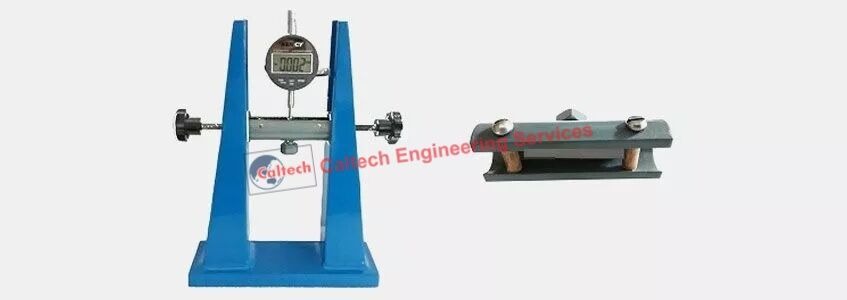Caltech India manufacture and supply stress corrosion cracking bent-beam testing instrument to accurately determine the resistance to sulfide stress corrosion cracking (SSC) as per NACE TM0177 Standard Method B and ISO 7539. We are a pre-eminent Bent beam sohic test suppliers. We are also supplying defection device to measure the accurate deflection achieved by bending. NACE TM0177 describes Laboratory Testing of Metals for Resistance to Sulfide Stress Cracking and Stress Corrosion Cracking in H2S Environments.
NACE TM 0177 Method B, the NACE Standard Bent-Beam Test, provides for testing carbon and low-alloy steels subjected to tensile stress to evaluate resistance to cracking failure in low-pH aqueous environments containing H2S. The compact size of the bent- beam test specimen facilitates testing small, localized areas and thin materials. Bent beam test specimens loaded to a particular deflection give a failure/no-failure test result. We recommend to use this test for thin material thickness or low diameter pipe materials and welding test. This method involves deflecting each test specimen in a series by applying a bending stress. The stressed test specimens then are exposed to the test environment, and the failure (or no-failure) by cracking is determined hence becoming very popular and easy test method for labs. There is also benefit in the method which constitutes a constant- deflection test of low test specimen compliance. The computed stress is called a pseudo-stress because it does not reflect. At a time 12 to 16 samples can be tested.
Leading laboratories with best H2S testing capabilities uses Caltech Engineering Services India supplied corrosion testing instruments. Complete range of corrosion testing instruments assists to prevent corrosion and control corrosion in oil & gas, sour gas production, offshore, gas treating plants, and petroleum refineries. The steel and pipe manufacturing industry, offshore and oil & gas companies selectively evaluate line pipe. Plate materials from current mill runs of product to determine if these products display any particular sensitivity to the HIC phenomena.
NACE (National Association of Corrosion Engineers, USA) specify Stress Corrosion Cracking Test (SSCC) as per NACE TM0177 and recommend following test methods:
Method A: Tensile Test (Proof Rings) with Solution A (acidified), Solution B (acidified and buffered) and Solution C
Method B: Bent Beam Test (3 / 4 Point Bent)
Method C: Standard C Ring Tests
Method D: Standard Double Cantilever Beam (DBC) Test
NACE TM-0177 Method B specifies use of solution The test solution shall consist of 0.5 wt% glacial acetic acid dissolved in distilled or deionized water. For example, 5.0 g of glacial acetic acid can be dissolved in 995 g of distilled or deionized water. NaCl shall not be added to the test solution.
Test Vessel with standard environment chamber is machined from clear, durable acrylic to permit instant visual observation of the specimen at all times. Glass with acrylic vessels is also available at option of user. O-ring seals are provided to prevent any leakages from test vessel. Individual test vessels are tested with hydro test before dispatch.
Caltech Engineering Services, Mumbai India has supplied facilities for four-point bend test (4 point bend SSCC Test) as per NACE/ ASTM standard and HIC Test (Hydrogen Induced Cracking) as per NACE TM 0284 to number of users.
Caltech Engineering Services, Mumbai India also provides instruments to customer built requirements for research (R&D) and special applications. Autoclaves for high temperature and high-pressure tests for conducting stress-corrosion cracking at elevated temperature (SCC) are also available at request of customer.
Alongside being a bent beam sohic test suppliers, we also manufacture SSC Proof Rings, 4 point bend SSC test, HIC Test Apparatus, SOHIC Ring Test Apparatus
Technical Assistance
Caltech Engineering Services technician and experts can provide technical assistance at the request of customers.
In India, we have various customers from Mumbai, Delhi, Bangalore, Chennai, Hyderabad, Ahmedabad, Kolkata, Surat, Pune, Jaipur, Lucknow, Kanpur, Nagpur, Visakhapatnam, Indore, Bhopal, Patna, Vadodara, Ghaziabad, Ludhiana, Coimbatore, Madurai, Nashik, Srinagar, Aurangabad, Dhanbad, Allahabad and Ranchi in India.
